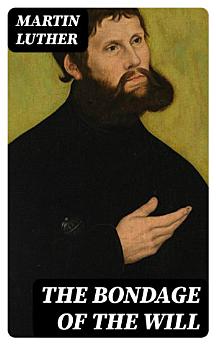The Bondage of the Will
Martin Luther
Nov 2022 · DigiCat
Ebook
241
Pages
family_home
Eligible
info
reportRatings and reviews aren’t verified Learn More
About this ebook
In 'The Bondage of the Will', Martin Luther engages in a profound theological debate with humanist scholar Desiderius Erasmus. Luther's treatise, a cornerstone of Reformation thought, masterfully contests Erasmus' beliefs on free will from a scriptural and dogmatic standpoint. The work is more than a rebuttal; it is an articulation of Luther's pivotal doctrine of salvation by grace alone, a stance placing him at odds with Roman Catholic orthodoxy. His literary style is combative yet eloquent, ensconcing his theological positions within a web of rigorous argumentation and a deep understanding of Pauline doctrine, positioning the book within the historical context of early Protestantism and the wider humanist discourse of the time. Martin Luther, a seminal figure in religious history, was stimulated by the erosion of ecclesiastical authority and a personal journey towards spiritual enlightenment. The conviction in his predestinarian views was likely bolstered by his interpretation of Augustine and Pauline letters, which informed his steadfast opposition to the then-dominant Catholic Church. 'The Bondage of the Will' represents Luther's resolve to fortify the theological foundations of the nascent Lutheran movement, a response fueled by his contentious perspective on mankind's spiritual incapacity to merit salvation without divine intervention. Scholars and lay readers alike will find 'The Bondage of the Will' an indispensable text in understanding the theological bedrock upon which the Protestant Reformation was built. Readers interested in the genesis of Lutheran doctrine, the intricacies of pre-Reformation debates, and the enduring question of determinism versus free will will discover Luther's work rigorously argued and impassionedly written. As a seminal piece of theological literature, it comes highly recommended for its vital role in shaping Western religious thought and for providing a critical lens through which to view the intellectual and doctrinary struggles of the early 16th century.
About the author
Martin Luther (1483–1546) remains one of the pivotal figures of Western history and theology, best known for his role in the Protestant Reformation. A German theologian, priest, and professor, Luther's scholarship and religious fervor propelled him into the heart of a movement that would reshape Christendom. Most notably, his disputation of the Catholic Church's practice of indulgences sparked widespread theological debate and eventually led to his excommunication. Luther's extensive body of work includes sermons, theological treatises, and biblical translations, with one of his most significant contributions being 'The Bondage of the Will,' published in 1525. In this seminal text, Luther confronts the teachings of Desiderius Erasmus on human free will, vehemently arguing the notion of 'sola scriptura' and salvation by grace alone, central tenets of Lutheran theology. His vigorous prose and frank critique of contemporaneous religious doctrines exemplify a literary style marked by candid explication and pointed rhetoric. Luther's influence extended beyond theology into the realms of literacy and education, largely due to his translation of the Bible into the vernacular, making Scripture accessible to the layperson and facilitating the spread of literacy. An in-depth appraisal of Luther's works reveals an indelible legacy that continues to be a subject of scholarly attention and religious discourse.
Rate this ebook
Tell us what you think.
Reading information
Smartphones and tablets
Install the Google Play Books app for Android and iPad/iPhone. It syncs automatically with your account and allows you to read online or offline wherever you are.
Laptops and computers
You can listen to audiobooks purchased on Google Play using your computer's web browser.
eReaders and other devices
To read on e-ink devices like Kobo eReaders, you'll need to download a file and transfer it to your device. Follow the detailed Help Center instructions to transfer the files to supported eReaders.








